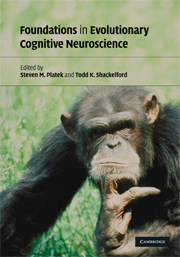Book contents
- Frontmatter
- Contents
- List of contributors
- 1 Introduction to evolutionary psychology: A Darwinian approach to human behavior and cognition
- 2 The evolution of general fluid intelligence
- 3 The role of a general cognitive factor in the evolution of human intelligence
- 4 Where there is an adaptation, there is a domain: The form-function fit in information processing
- 5 Invention and community in the emergence of language: Insights from new sign languages
- 6 Origins of the language: Correlation between brain evolution and language development
- 7 The evolutionary cognitive neuropsychology of face preferences
- 8 Sex differences in the neural correlates of jealousy
- Index
6 - Origins of the language: Correlation between brain evolution and language development
Published online by Cambridge University Press: 20 January 2010
- Frontmatter
- Contents
- List of contributors
- 1 Introduction to evolutionary psychology: A Darwinian approach to human behavior and cognition
- 2 The evolution of general fluid intelligence
- 3 The role of a general cognitive factor in the evolution of human intelligence
- 4 Where there is an adaptation, there is a domain: The form-function fit in information processing
- 5 Invention and community in the emergence of language: Insights from new sign languages
- 6 Origins of the language: Correlation between brain evolution and language development
- 7 The evolutionary cognitive neuropsychology of face preferences
- 8 Sex differences in the neural correlates of jealousy
- Index
Summary
Introduction
The question about when and how language emerged in human evolution has been a major and intriguing question since at least the classical Egyptian times. It is reported that the Pharaoh Psamtik took two children to be raised by deaf-mutes, in order to find out what was the first and natural language. When these children were later observed, one of them said something that sounded like bekos, the Phrygian word for bread. From this, Psamtik concluded that Phrygian was the first and original language. During the following centuries, the origin of language continued as a most intriguing and polemic question. Different approaches and interpretations were proposed throughout history. At a certain point the debate became so complex and hot that in 1866 the Linguistic Society of Paris banned discussion of the origin of language, arguing that it is an unanswerable problem.
Contemporary research on linguistics, archeology, comparative psychology and genetics has significantly advanced understanding of the origins of human language (e.g., Bickerton, 1990; Corballis, 2002, 2006; Enard et al., 2002; Mallory, 1989; Nowak and Krakauer, 1999; Ruhlen, 1994; Swadesh, 1967; Tallerman, 2005). Different disciplines have contributed from their own perspective to make the human communication system more comprehensible.
The purpose of this paper isnot to further review anddiscuss thehistorical origins of language, but to relate what is known (or supposed) on the origins of language, with contemporary neurology and neuropsychology data, particularly with the area of aphasia.
Information
- Type
- Chapter
- Information
- Foundations in Evolutionary Cognitive Neuroscience , pp. 153 - 174Publisher: Cambridge University PressPrint publication year: 2009
Accessibility standard: Unknown
Why this information is here
This section outlines the accessibility features of this content - including support for screen readers, full keyboard navigation and high-contrast display options. This may not be relevant for you.Accessibility Information
- 5
- Cited by
